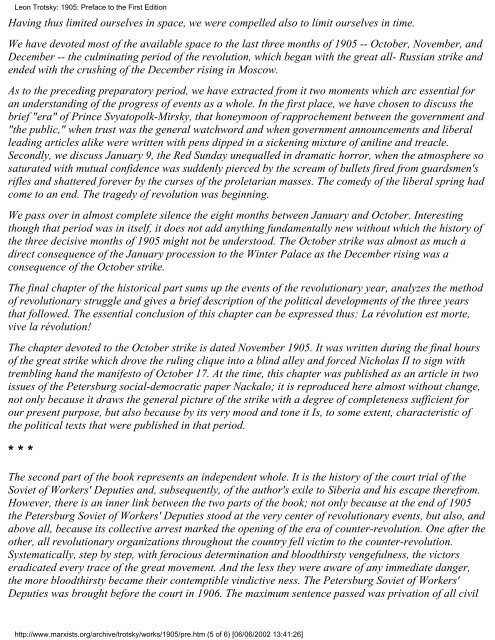Leon Trotsky: 1905
Leon Trotsky: 1905
Leon Trotsky: 1905
You also want an ePaper? Increase the reach of your titles
YUMPU automatically turns print PDFs into web optimized ePapers that Google loves.
<strong>Leon</strong> <strong>Trotsky</strong>: <strong>1905</strong>: Preface to the First Edition<br />
Having thus limited ourselves in space, we were compelled also to limit ourselves in time.<br />
We have devoted most of the available space to the last three months of <strong>1905</strong> -- October, November, and<br />
December -- the culminating period of the revolution, which began with the great all- Russian strike and<br />
ended with the crushing of the December rising in Moscow.<br />
As to the preceding preparatory period, we have extracted from it two moments which arc essential for<br />
an understanding of the progress of events as a whole. In the first place, we have chosen to discuss the<br />
brief "era" of Prince Svyatopolk-Mirsky, that honeymoon of rapprochement between the government and<br />
"the public," when trust was the general watchword and when government announcements and liberal<br />
leading articles alike were written with pens dipped in a sickening mixture of aniline and treacle.<br />
Secondly, we discuss January 9, the Red Sunday unequalled in dramatic horror, when the atmosphere so<br />
saturated with mutual confidence was suddenly pierced by the scream of bullets fired from guardsmen's<br />
rifles and shattered forever by the curses of the proletarian masses. The comedy of the liberal spring had<br />
come to an end. The tragedy of revolution was beginning.<br />
We pass over in almost complete silence the eight months between January and October. Interesting<br />
though that period was in itself, it does not add anything fundamentally new without which the history of<br />
the three decisive months of <strong>1905</strong> might not be understood. The October strike was almost as much a<br />
direct consequence of the January procession to the Winter Palace as the December rising was a<br />
consequence of the October strike.<br />
The final chapter of the historical part sums up the events of the revolutionary year, analyzes the method<br />
of revolutionary struggle and gives a brief description of the political developments of the three years<br />
that followed. The essential conclusion of this chapter can be expressed thus: La révolution est morte,<br />
vive la révolution!<br />
The chapter devoted to the October strike is dated November <strong>1905</strong>. It was written during the final hours<br />
of the great strike which drove the ruling clique into a blind alley and forced Nicholas II to sign with<br />
trembling hand the manifesto of October 17. At the time, this chapter was published as an article in two<br />
issues of the Petersburg social-democratic paper Nackalo; it is reproduced here almost without change,<br />
not only because it draws the general picture of the strike with a degree of completeness sufficient for<br />
our present purpose, but also because by its very mood and tone it Is, to some extent, characteristic of<br />
the political texts that were published in that period.<br />
* * *<br />
The second part of the book represents an independent whole. It is the history of the court trial of the<br />
Soviet of Workers' Deputies and, subsequently, of the author's exile to Siberia and his escape therefrom.<br />
However, there is an inner link between the two parts of the book; not only because at the end of <strong>1905</strong><br />
the Petersburg Soviet of Workers' Deputies stood at the very center of revolutionary events, but also, and<br />
above all, because its collective arrest marked the opening of the era of counter-revolution. One after the<br />
other, all revolutionary organizations throughout the country fell victim to the counter-revolution.<br />
Systematically, step by step, with ferocious determination and bloodthirsty vengefulness, the victors<br />
eradicated every trace of the great movement. And the less they were aware of any immediate danger,<br />
the more bloodthirsty became their contemptible vindictive ness. The Petersburg Soviet of Workers'<br />
Deputies was brought before the court in 1906. The maximum sentence passed was privation of all civil<br />
http://www.marxists.org/archive/trotsky/works/<strong>1905</strong>/pre.htm (5 of 6) [06/06/2002 13:41:26]















![tyf Enf=O=n]lgg](https://img.yumpu.com/47584932/1/190x245/tyf-enfonlgg.jpg?quality=85)

